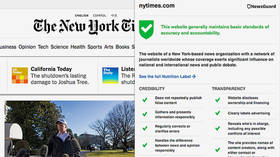Millions of US kids to be told which news is fake

NewsGuard, a controversial service that ranks news sources read by clients online based on how trustworthy it considers them to be, will soon be available for free to millions of schoolchildren in the US.
The New York-based company signed a licensing agreement with the American Federation of Teachers (AFT), the second-largest teachers’ union in the country, making the service available to members and their students, the two said this week.
AFT President Randi Weingarten called the deal a game-changer when it comes to helping kids, “particularly our middle, high school and postsecondary students, separate fact from fiction.”
She called NewsGuard “a beacon of clarity to expose the dark depths of the internet and uplift those outlets committed to truth and honesty rather than falsehoods and fabrications.”
The service was launched in 2018, when the position that Big Tech should openly censor information that it deemed undesirable was not as pervasive in the US as it is today. NewsGuard ranks thousands of news sources with a “street light” color code, and puts a nutrition label-like explanation on each one to explain the score.
The service comes in the form of a browser plug-in and costs $2.95/month, except for users of Microsoft Edge, since Microsoft licensed it to be a built-in feature of its browser in 2019.
NewsGuard claims to be apolitical and to apply a rigorous process when assessing the integrity of news outlets. After its launch, skeptics, however, questioned the abundance of people linked to the US government among its advisory board.
One of them, Richard Stengel, who served under Barack Obama as the Department of State’s public affairs chief, said on the record that state propaganda was fine and that all nations subjected their citizens to it.
The ranking of legacy US publications issued by NewsGuard tend to be safely in the green zone, while outlets associated with America’s global adversaries are usually marked red.
The service was co-founded by former publisher of The Wall Street Journal Louis Crovitz and Court TV cable station founder Steven Brill. Last year, the firm doubled its revenue after sealing a number of licensing deals and started to make a profit, they told CNN Business earlier this month.
It has also expanded into other lines of businesses, like consulting advertisers who don’t want to take a reputation hit for inadvertently running ads on problematic websites. But it couldn’t get a foothold in the lucrative business of third party fact-checking for big social media companies like Twitter and Facebook, the report said.














